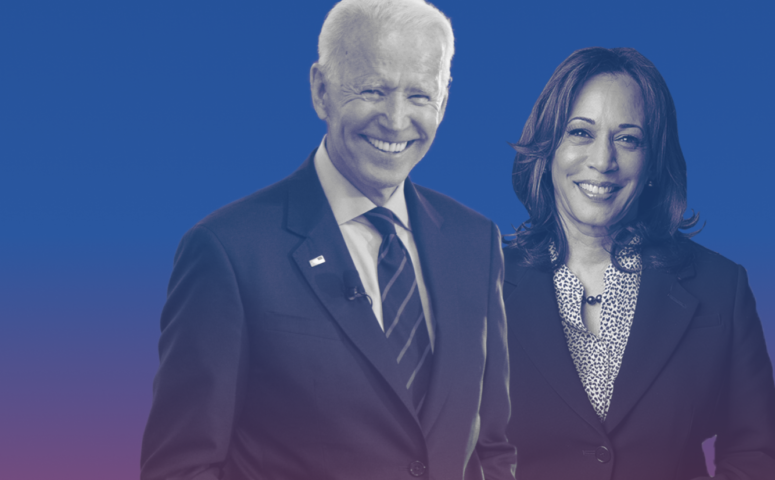How did we get to the point of expecting that every single thing the president of the United States utters is a lie? Growing up as a privileged white male, I thought the president told the truth. My siblings and I were brought up to think the truth was a core principle of being. Then I got interested in politics because the president lied. Now I am thinking, how can you reset after getting sucked into a black hole?
Now that Joe Biden has named Kamala Harris as his running mate, I am relieved. She is not a progressive but as a mixed race woman she might symbolize the future. Might she take over one day? I just hope she is more honest than the men have been.
Look, Biden doesn’t infuriate or excite me. He seems like a stand-in, as Gerald Ford was in the post-Nixon era. Someone bland and safe post-Trump. But right now, is that good enough? Or even what we need? Feels like it’s too late for either party to change cars this late in the drive.
We once had an actor posing as a politician. That didn’t go well. Most recently, a game show host and shady developer posing as a president. That went worse. Now we seem to have come around to a politician posing as an actor posing as a politician, hair plugs, aviator glasses, perfect teeth, and all. Look, I’ll vote for Biden, but he isn’t convincing as an honest savior. Nor does he seem like a pathological liar. It’s as if honesty doesn’t even matter anymore. It got sucked into the black hole.
My parents believed the presidents before we were born. They had roots in a plainspoken rural life, where agriculture was at the center of the American story. Having lived on the Pacific Coast during the war, they seemed to compartmentalize the atomic bombings and the Japanese internment camps and gave vague adult responses to our kid questions about those horrors.
My mother’s father was born in Minnesota but homesteaded in Saskatchewan and did well for himself and his family. The dust bowl ended their wheat farm prosperity and sent them back to the United States to “dirt farm” in Oregon. My father’s father was a veterinarian and his mother a nurse. They had settled California a long time ago (think Donner party but finding the right route) and enjoyed a comfortable life in Berkeley, where my grandfather worked for Cutter Labs, and then in Colusa, a rural town where he had an independent practice. During the Depression, everybody still needed their animals cared for, and my father’s family had good cars and spent summers in Santa Cruz.
Both of my parents and their families believed in the American dream but also knew the trials of working in hop fields and canneries, and they knew the value of animals to a struggling family. Neither of them saw active service in World War II. My father went to work for the phone company in 1940, and my mother became a teacher. They revered FDR, believed Truman, and trusted Ike. The presidency was a somber office.
They certainly didn’t vote for Richard Nixon in 1960. (As my maternal grandmother said, “He has shifty eyes.”) They voted for Kennedy even if they didn’t trust his wealthy background. We saw him on television and watched the funeral after he was killed. My brother and I were in our first fall of school. We did not see the Zapruder tape or the shooting of Lee Harvey Oswald until we were much older. As five-year-olds, we didn’t know that this tragedy was related to a large and complex web beyond one man. Later in the 1970s, all three of us kids went to a high school named for the young president. For a long time, we believed Kennedy had little to do with Vietnam and everything to do with civil rights. We believed him.
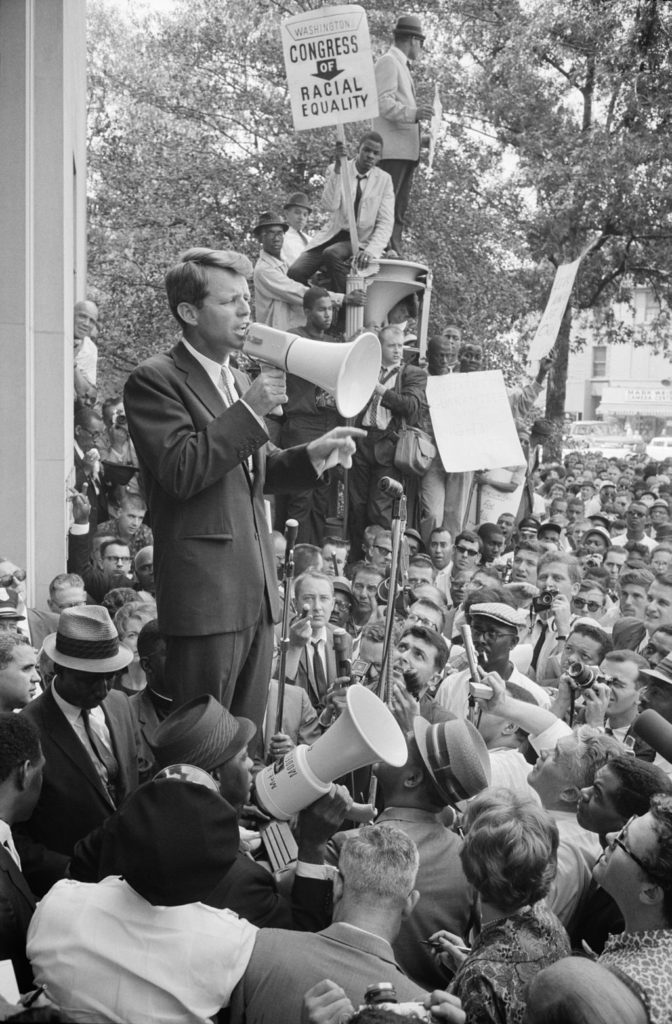
Robert F. Kennedy speaks to a crowd outside the DOJ building in June 1963. Warren Leffler / Public domain.
In the summer of 1964, the portable black and white TV was brought into the bathroom so my father could watch the Democratic Convention while we took a bath. It’s no wonder that Robert Caro has spent much of his career writing about Lyndon Johnson. Those books would reveal Johnson’s lack of honesty, but also his genius, the miracle he accomplished with the Civil Rights and Voting Rights acts. And then he, General Westmoreland, and the rest of the administration were caught lying about the Vietnam War, and everything changed. America was saving itself and killing others.
Our parents were not avid followers of everything political, but they felt it was their civic responsibility to stay informed. By 1968, I was addicted to the drama playing out on the news. Most of my friends’ parents wanted Eugene McCarthy for president. I can still remember the Ben Shahn–designed posters of the dove. I held on to the Kennedy dream and loved seeing him with long hair, supporting Cesar Chavez. My parents wanted the son of a pharmacist, Hubert Humphrey. They still distrusted “limousine liberals.”
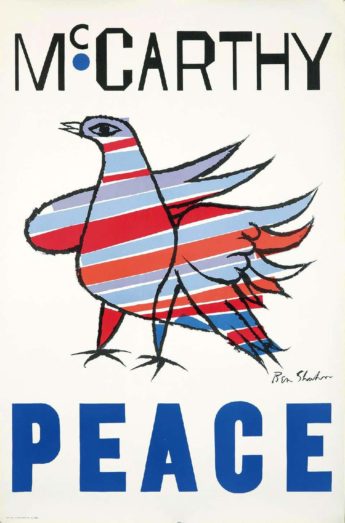
Ben Shahn. McCarthy Peace, 1968
Johnson’s withdrawal from the race in March of 1968 surprised everybody. Within a few days, Martin Luther King Jr. was shot in Memphis. Two months later, Robert Kennedy was assassinated in Los Angeles. I think it was the summer of 1968 when my parents began to lose hope for the future.
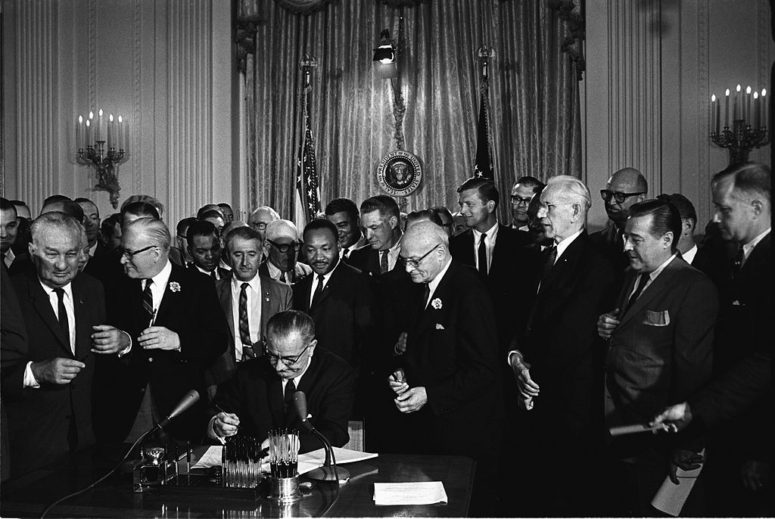
President Lyndon B. Johnson signs the 1964 Civil Rights Act as Martin Luther King, Jr., and others, look on. Public domain image.
Later that summer, the streets of Chicago turned bloody as the police beat protestors, some to death. My parents still supported Humphrey, but the unjustified attack on young people a few years older than their own kids definitely changed them. They knew that they had been lied to. They had been lied to about Vietnam and the real threats facing our country. It wasn’t Communism, it was our own leaders.
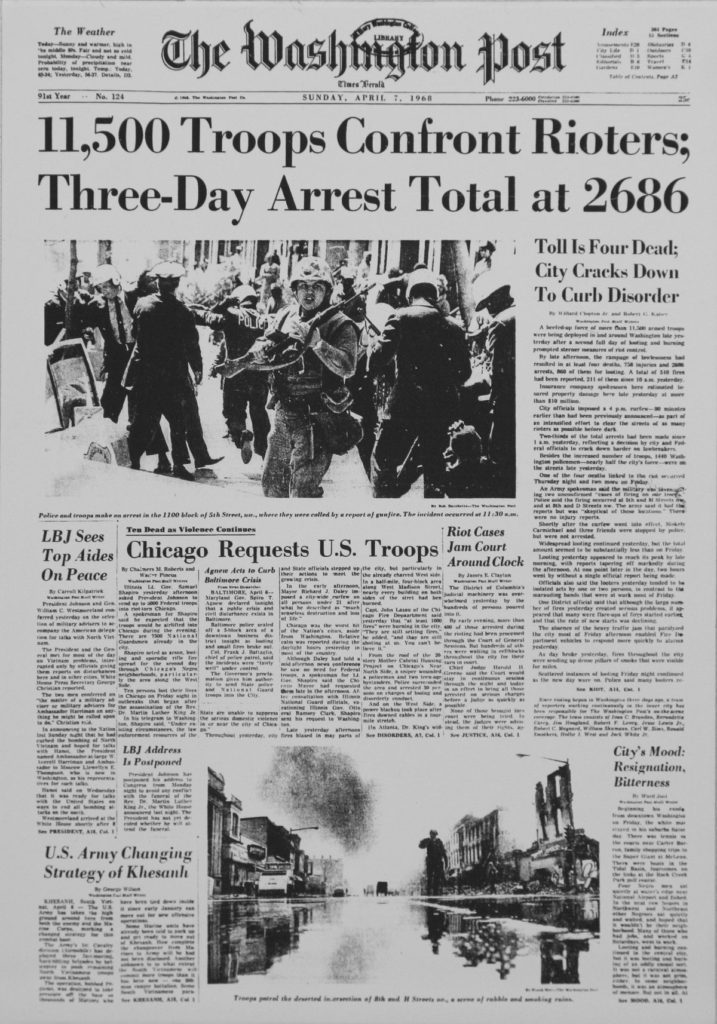
The Washington Post on April 7, 1968. 3 days after the assassination of Martin Luther King.
Children like us turned cynical even though our parents did not openly express their despair. We were ready for Nixon’s lies. After he won in the fall of 1968, he continued to lie about Vietnam. We knew he was lying about Cambodia in 1970. His desire for legacy led him to open a relationship with China and the visit in 1972. What was he up to? Redemption? Perhaps it is true that it was only something a staunch anti-Communist like Nixon could get away with.
The killing in Southeast Asia went on, and in 1972, we pinned our hopes on George McGovern, a kind and genuine liberal. He stumbled with Tom Eagleton as his initial running mate. As a young teenager, I shared McGovern literature outside our town’s market and went to a rally at a local high school in Richmond where the second vice presidential candidate, Sargent Shriver, spoke. I even convinced my very cautious mother to put a McGovern/Shriver bumper sticker on her car. This was no small thing. This meant that all of her colleagues at work would see where she stood.
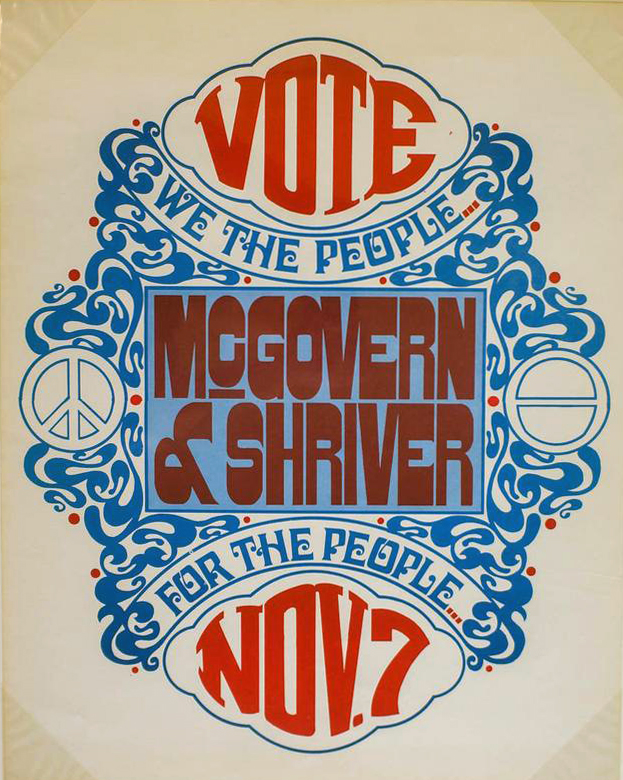
McGovern Shriver Presidential Poster
We knew about Nixon covering up the Watergate break-in. We were sick of the constant lying. I love Pauline Kael’s quote about Nixon winning: “I live in a rather special world. I only know one person who voted for Nixon. Where they are I don’t know. They’re outside my ken. But sometimes when I’m in a theater I can feel them.” The folks Hillary Clinton later referred to as a “basket of deplorables.”
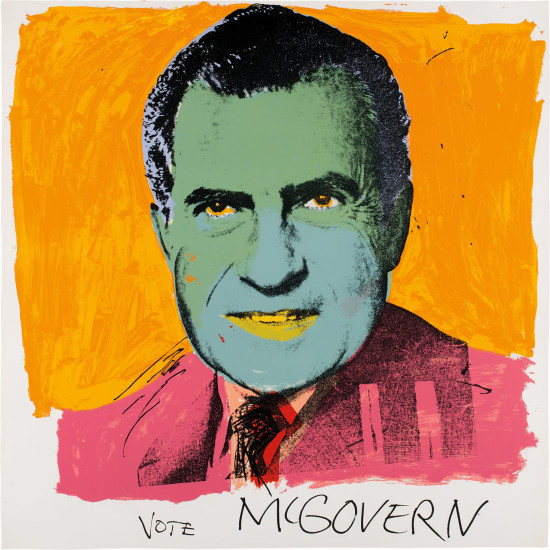
Andy Warhol. Vote McGovern, 1972
In 1976, we didn’t know what to make of Jimmy Carter. He won because he said he was an outsider, and after Nixon, that was enough. We didn’t really trust Carter, because he was a southerner. He was the first presidential candidate I ever cast a vote for. After a lackluster term, we thought Carter a decent if dull compromise, but we certainly didn’t think a mediocre Hollywood star would make a good president. Ronald Reagan’s whole life was made up. We knew this, living under his reign as California’s governor.
In 1980, the actor defeated the peanut farmer. Others have written how this disaster prepared us for the current one. Voodoo economics indeed. Trickle down was surge up! The middle classes were taxed to subsidize the very rich. Don’t worry, you’ll get on the gravy train if you deserve it.
Following the senile actor was a former CIA head. That says it all. Deceit and death as a way of life. Clarence Thomas, George H. W. Bush’s appointee, lied his way onto the Supreme Court. But the voodoo part of the economics failed, and a recession did Bush in after one term.
Bill Clinton was Southern, but unlike Carter, incredibly charming. I still remember sharing champagne with my parents on the night he was elected. We didn’t quite trust him either, but we thought he would outsmart the lying Republicans. It was the last president my father saw elected. Clinton’s lies are now legendary. But nobody was surprised, least of all the Republicans who tried to impeach him. It was just payback for Nixon’s demise. Although the lie took the wind out of Clinton’s sails, some part of the “me too” foundation was laid.
How George W. Bush got elected will remain a subject of debate for some time. Chances are he didn’t get elected. But he was still president. He turned the national tragedy of 9/11 into a never ending national nightmare. He did it by lying. There were no weapons of mass destruction. There was no justice. There was suffering. By then both of my parents were gone. At least my siblings agreed with me! But I was glad my parents didn’t have to see 9/11 or its aftermath.
Barack Obama hit the right note with Shepard Fairey’s poster. Hope. But the conservative white folks played a brilliant game of chess against him. And while he has been credited with some progress, most of his programs were stifled. With Citizens United the law of the land, he keened towards the corporations and allowed the military industrial complex too much sway. Unintentionally, Edward Snowden called him out. Now the poster might read Hopes Dashed. Despite the deceit of the NSA, CIA, and FBI, Obama’s reputation remains stronger than most of the other presidents of my lifetime. His staff weren’t found guilty of any crime. He revealed just how deep white racism is in this country.
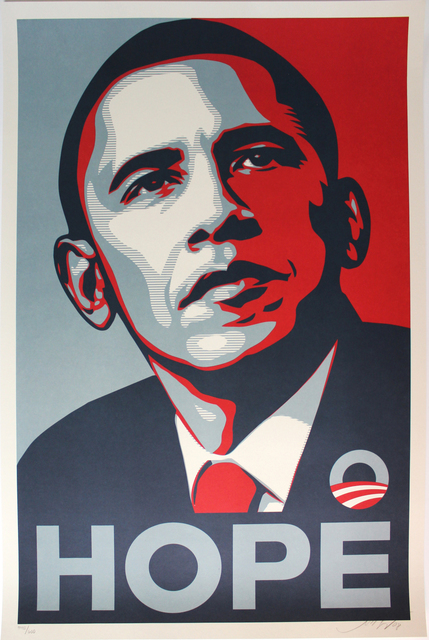
Shepard Fairey. Hope, 2008
That racism and its entanglements with the greedier side of late capitalism fused together to create the nightmare presidency of Donald Trump. Hillary Clinton lost for any number of reasons, including rampant lying by the Republicans. Trump’s surprising gift may have been the truth. He brought us the truth in two distinct ways.
First, he became the black hole of deceit. Every day he tweets a new lie. He lies like most of us breathe. It is his oxygen. We are nearly numb to what he says. He has equated the US with endless lying. The disrespect he has brought to the office of the presidency is obvious to all but the most rampant racist.
There is nowhere to go but up in terms of returning the principle of truth to the presidency. Beyond the overwhelming personal deceit, though, is how his particular brand of dishonesty has pulled the curtain back on some key truths about our society. (He’s had a little help from other racists.)
- The country is guilty of original sin. That would be the enslavement of Africans and the genocide of the original people. We are all standing on stolen land. With the exception of the original people, we are all immigrants.
- The country is built on a lie. The principles of freedom and equality were only intended for affluent white men.
- Unfettered capitalism profits a few white people, mostly men. There is no trickle down, just flood up.
- Capitalism itself is a lie. It is subsidized by the government, again largely for white men.
- Ignoring science kills people.
Trump’s lies have cost human lives, perhaps more than most of our wars. Biden’s election will be like hitting the pause button. In that space, I hope there will be enough sanity that we can have a non-violent revolution.
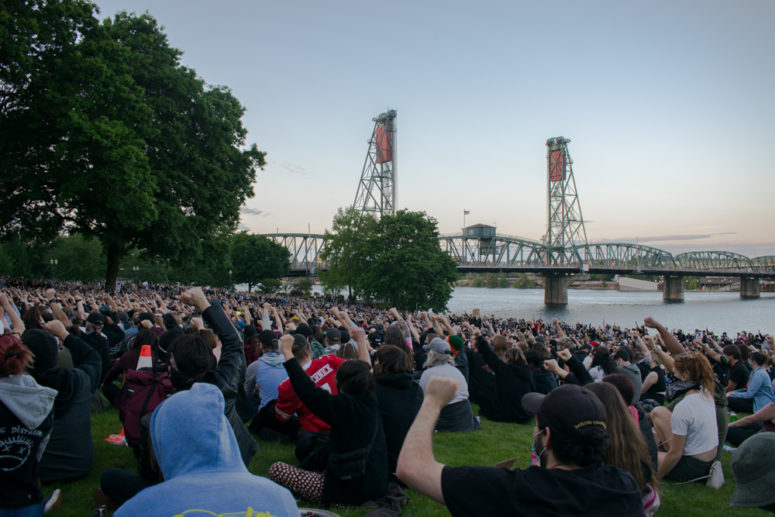
Black Lives Matter protesters in Portland’s Tom McCall Waterfront Park on June 3, 2020. Photo: Henryodell / CC BY-SA 4.0
